I’m a rambler, I’m a rambler from Manchester way
I get all my pleasure the hard moorland way
I may be a wage slave on Monday
But I am a free man on Sunday
Ewan MacColl, The Manchester Rambler
A song of rebellion, hope and adventure.
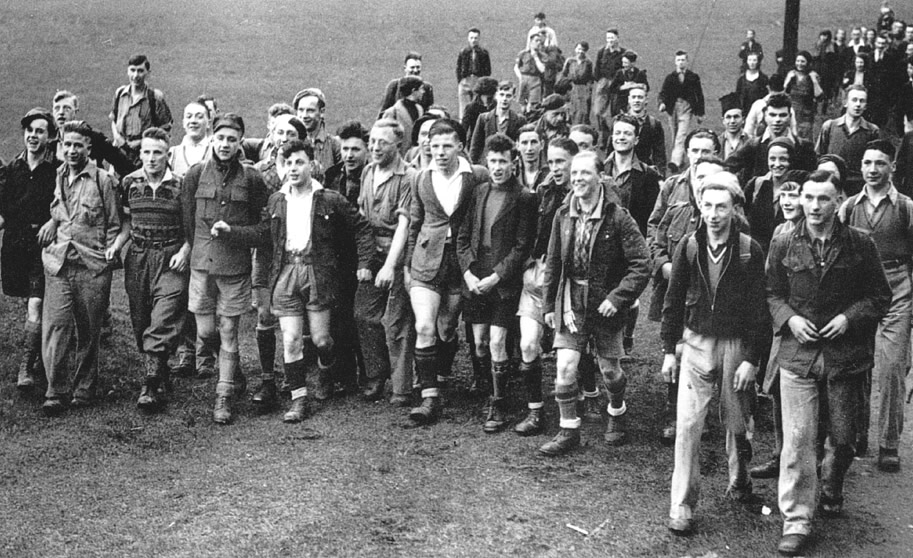
On Friday 28 April, Freshwalks pays tribute to the legendary events of the Mass Trespass of April 1932. We plan to walk an entire 30km loop of Kinder Scout, a route that will see us end the day back in the charming Peak District village of Edale.
Back then, over 400 people, mostly working class ramblers from Manchester took part in a mass trespass onto Kinder Scout – an unforgiving but magnificent moorland plateau and the highest part of the Peak District.
Led by the remarkable Bernard ‘Benny’ Rothman it has since been described as “the most successful direct action in British history”. The trespass was controversial at the time, and ever since, being seen as a working class struggle for the right to roam versus the rights of the wealthy to have exclusive use of moorlands for grouse shooting.
Manchester in the 1930s was like any northern city – a grim concrete jungle with harsh working and living conditions. They were tough times with high unemployment, extreme poverty and poor public health. Come the weekend, factory workers would head for the countryside, seeking an escape loaded with nothing more complicated than exercise, fresh air and adventure.
Cars were too expensive for most people so trains would be jam-packed with ramblers on a Sunday morning, queues snaking out of city-centre stations. However, with increased participation in rambling and cycling, the busy and well-trodden paths highlighted how unjust it was, that the general public were banned from accessing the highest peaks with the best views.
The wildest, most remote landscapes were off limits and fiercely protected by landowners and gamekeepers, who wouldn’t think twice about issuing a beating to random trespassers, seeking genuine space and solitude. Benny Rothman and friends, having suffered themselves in such a way, notably at Yellowslacks brook attempting to head onto Bleaklow, early 1932 had finally had enough. They resolved to rally a mob large enough so no group of landowners or gamekeepers, armed or otherwise, could stand in their way. And so, the idea of the Mass Trespass was hatched.
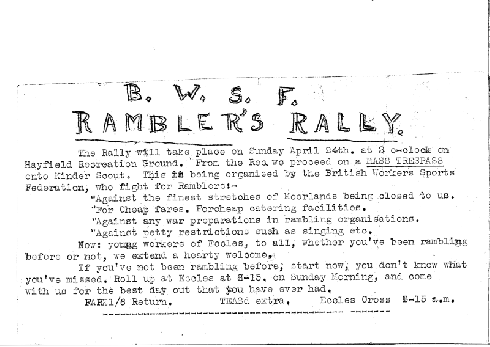
The event was organised by Rothman and the Manchester branch of the British Workers Sports Federation whose press officer at the time just happened to be one James Henry Miller – better known as one of Salford’s finest, Ewan MacColl. Having notified the regional press to spread the word beforehand, the local Derbyshire constabulary turned out in force to deal with any potential trouble.
The trespass began at Bowden Bridge quarry near Hayfield. It proceeded up William Clough towards the plateau of Kinder Scout, where there were violent scuffles with gamekeepers. The ramblers were able to reach their destination and eventually met with a smaller Sheffield faction who had set off from Edale. On the return, five ramblers were arrested, including Benny Rothman, with another detained earlier. Trespass was not, and still is not, a criminal offence in any part of Britain, but these five men from Manchester would receive jail sentences for offences relating to violence against the keepers.
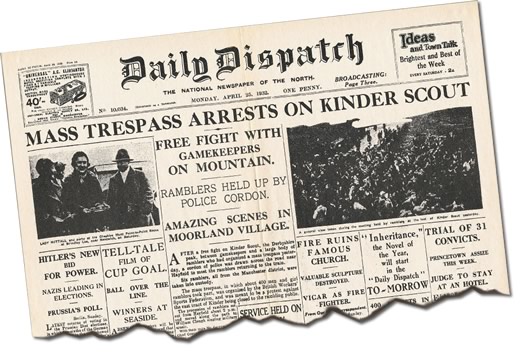
This act of civil disobedience was one of the most successful in British history and a catalyst for change. A few weeks later, 10,000 ramblers – the largest number in history – assembled for a rally in the Winnats Pass, near Castleton, and the pressure for greater access continued to grow.
It arguably led to the passage of the National Parks legislation in 1949, contributing to the development of the Pennine Way and many other long distance footpaths. The mass trespass also marked the beginning of a campaign by The Ramblers’ Association, culminating in the Countryside and Rights of Way Act 2000, which legislates rights of the public to walk on access land. The introduction of this Act was a key promise in the manifesto which brought New Labour to power in 1997. Hard to imagine it all began 68 years earlier with a bunch of scallywags from Salford and Cheetham Hill taking matters into their own hands.
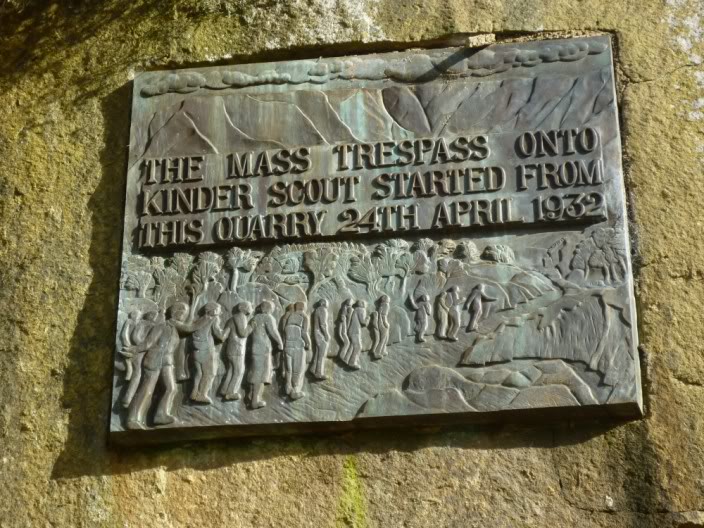
It should be noted that our route in no way attempts to retrace the footsteps of those who took part in the Mass Trespass. Instead, it seeks to celebrate the entirety of the very land those young ramblers wished to gain access to that infamous day. It’s nearly sold out but you can still join us here and pay homage to the heroics of those Mancunians 85 years ago this month. These young lads sacrificed their freedom so we could enjoy ours. Let’s not waste the opportunity.
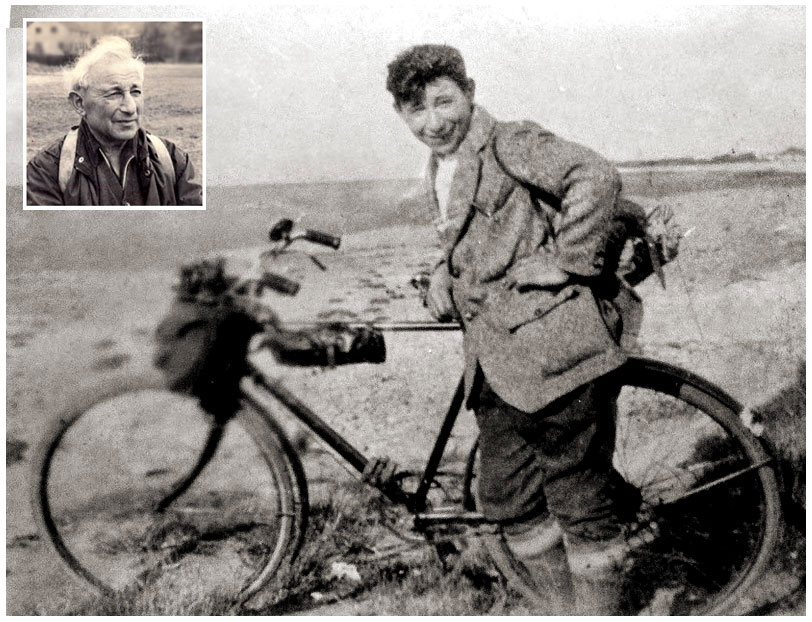
Political activist, immigrant, rambler.
(from Wikipedia)
Bernard ‘Benny’ Rothman (1 Jun 1911 – 23 Jan 2002) was born in Cheetham Hill – into a family of Jewish immigrants from Romania. His poor family circumstances meant that Benny started work at the earliest opportunity rather than benefit from a scholarship he had won.
Working as an errand boy in the motor trade, he studied geography and economics in his spare time while his Aunt Ettie introduced him to The Ragged Trousered Philanthropists and the works of Upton Sinclair. Increasingly committed to the causes of socialism and communism, Rothman lost his job after getting into some trouble with the law while selling copies of the Daily Worker. During a period of unemployment, with the help of a bicycle salvaged from spare parts, he discovered the nearby wilderness regions of the Peak District and North Wales. The combination of his political activism and interest in the outdoors led to his participation in the mass trespass of 1932, an enterprise that resulted in a spell in jail and further employment difficulties.
In 1934, Rothman went to work at Avro in Newton Heath and instantly became an officer of the Amalgamated Engineering Union (AEU). At Avro’s, he met and married fellow communist Lily Crabtree but his political views became increasingly visible to his employer and he was dismissed. Rothman was active in working with Jewish groups in Manchester to oppose the campaigns of Sir Oswald Mosley’s British Union of Fascists. In 1936 he started work at Metropolitan Vickers at Trafford Park and was again soon an AEU official.
Until his death from a stroke, he was active in a wide range of political and conservation movement campaigns and organisations. Benny Rothman, died in 2002, but went down in history as the man who led the Kinder Mass Trespass.
View All Blogs